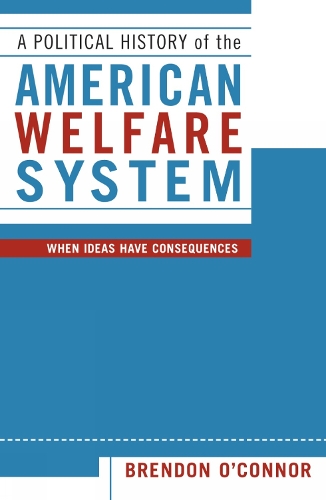
A Political History of the American Welfare System: When Ideas Have Consequences
(Paperback)
Publishing Details
A Political History of the American Welfare System: When Ideas Have Consequences
By (Author) Brendon O'Connor
Bloomsbury Publishing PLC
Rowman & Littlefield Publishers
7th October 2003
United States
Classifications
Tertiary Education
Non Fiction
361.60973
Physical Properties
Paperback
304
Width 150mm, Height 229mm, Spine 18mm
386g
Description
How did American welfare policy move from the ambitious and altruistic goals of LBJ's Great Society of the 1960s to the punitive and penurious provisions of the Personal Responsibility and Work Reconciliation Act of 1996 This book explores the power of ideology and rhetoric in the transformation of the American liberal welfare state. Based on historical analysis, detailed public policy critique, and original interview data, the story that unfolds is one of both personality and politics. Author Brendon O'Connor places the American welfare policy debate in wider perspective, showing how America's particular use of ideas and conceptions of economics and politics worked to reshape the national perception of poverty, morality, and economic responsibility over time.
Through wide reading, close textual analysis, and dozens of talks with liberal and conservative figures including Peter Edelman, David Ellwood, Ron Haskins, and Representatives E. Clay Shaw, Jr., Jim McCrery, and Sandy Levin, O'Connor dramatically demonstrates the shift in American welfare policy from left to right. This acute outside perspective enables us to see clearly just how we have arrived at the current post-liberal welfare era in the United States.
Reviews
O'Connor's timely volume is a vital reminder to scholars of American politics and government that ideas do indeed matter! He demonstrates how both liberals and conservatives in America have wrestled with the problem of accommodating the need to aid the disadvantaged with America's individualistic political culture. Moroever, his analysis of the politics behind the 1996 welfare reform, based on interviews with many of the key participants, is brilliant. A Political History of the American Welfare System has set the standard of scholarship on the politics of welfare reform. -- Nicol Rae, Florida International University
Ideas have consequences. The ideas that emerged in the sixties had more radical consequences than could have been anticipated, as the world came to be turned right-side-up. In this book, Brendon O'Connor's achievement is to track and explain this process and its practical results. An important book. -- Peter Beilharz, Curtin University
Brendon O'Connor's book provides a refreshingly balanced and sober assessment of the vexed issues around U.S. welfare policies, based on extensive research. For foreigners, the passions aroused by the debate on welfare in the U.S. is often hard to fathom, and O'Connor clarifies and illuminates the ways in which these debates often touch on competing visions of the nature of American society and of human nature itself. -- Dennis Altman, president, AIDS Society of Asia and the Pacific
O'Connor provides a complex, nuanced, and important analysis of a major policy transformation that mandated work requirements for poor women to receive income supports. Moreover, he analyzes U.S. conservative ideologies that have had and will continue to make major impacts on many public policies other than welfare during the Bush administration. -- Bruce Johnson, director, Institute for Special Populations Research
Author Bio
Brendon O'Connor is assistant professor in the School of Politics and Public Policy, Griffith University.
